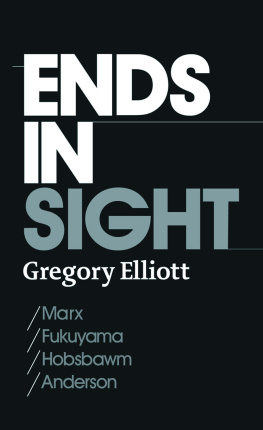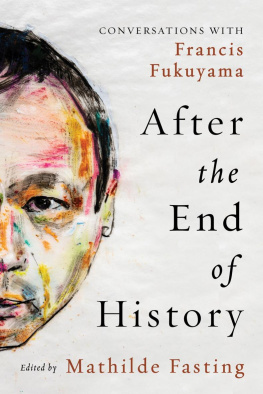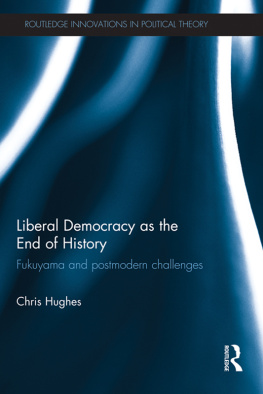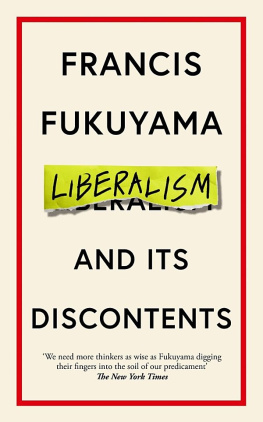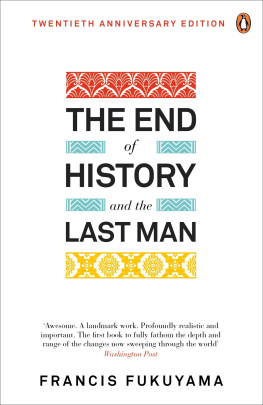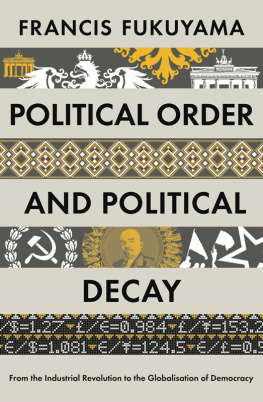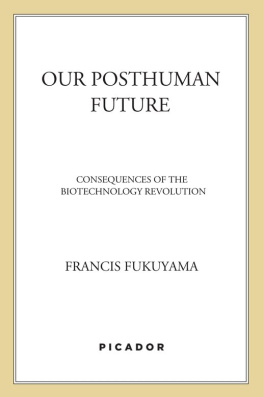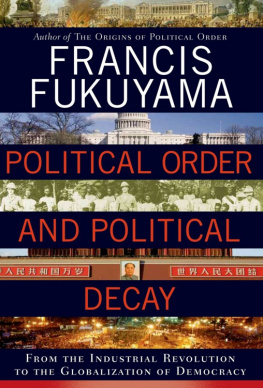Fukuyama Francis - Ends in sight: Marx/Fukuyama/Hobsbawn/Anderson
Here you can read online Fukuyama Francis - Ends in sight: Marx/Fukuyama/Hobsbawn/Anderson full text of the book (entire story) in english for free. Download pdf and epub, get meaning, cover and reviews about this ebook. City: London;Toronto, year: 2008, publisher: Between the Lines, Pluto Press, genre: Religion. Description of the work, (preface) as well as reviews are available. Best literature library LitArk.com created for fans of good reading and offers a wide selection of genres:
Romance novel
Science fiction
Adventure
Detective
Science
History
Home and family
Prose
Art
Politics
Computer
Non-fiction
Religion
Business
Children
Humor
Choose a favorite category and find really read worthwhile books. Enjoy immersion in the world of imagination, feel the emotions of the characters or learn something new for yourself, make an fascinating discovery.
- Book:Ends in sight: Marx/Fukuyama/Hobsbawn/Anderson
- Author:
- Publisher:Between the Lines, Pluto Press
- Genre:
- Year:2008
- City:London;Toronto
- Rating:3 / 5
- Favourites:Add to favourites
- Your mark:
- 60
- 1
- 2
- 3
- 4
- 5
Ends in sight: Marx/Fukuyama/Hobsbawn/Anderson: summary, description and annotation
We offer to read an annotation, description, summary or preface (depends on what the author of the book "Ends in sight: Marx/Fukuyama/Hobsbawn/Anderson" wrote himself). If you haven't found the necessary information about the book — write in the comments, we will try to find it.
Ends in sight: Marx/Fukuyama/Hobsbawn/Anderson — read online for free the complete book (whole text) full work
Below is the text of the book, divided by pages. System saving the place of the last page read, allows you to conveniently read the book "Ends in sight: Marx/Fukuyama/Hobsbawn/Anderson" online for free, without having to search again every time where you left off. Put a bookmark, and you can go to the page where you finished reading at any time.
Font size:
Interval:
Bookmark:

ENDS IN SIGHT
Marx/Fukuyama/Hobsbawm/Anderson
Gregory Elliott

First published 2008 by Pluto Press
345 Archway Road, London N6 5AA
and 839 Greene Street, Ann Arbor, MI 48106
www.plutobooks.com
First published in Canada in 2008 by
Between the Lines
720 Bathurst Street, Suite #404
Toronto, Ontario M5S 2R4
Canada
1-800-718-7201
www.btlbooks.com
Copyright Gregory Elliott 2008
The right of Gregory Elliott to be identified as the author of this work has been asserted by him in accordance with the Copyright, Designs and Patents Act 1988.
British Library Cataloguing in Publication
Data A catalogue record for this book is available from the British Library
ISBN 978 0 7453 2763 1 (hardback)
ISBN 978 0 7453 2762 4 (Pluto paperback)
ISBN 978 1 8970 7140 3 (Between the Lines paperback)
ISBN 978 1 7837 1900 6 ePub
ISBN 978 1 7837 1901 3 Kindle
Library of Congress Cataloging in Publication Data applied for
Library and Archives Canada Cataloguing in Publication
Elliott, Gregory
Ends in sight : Marx/Fukuyama/Hobsbawn/Anderson / Gregory
Elliott.
Includes bibliographical references and index.
ISBN 978-1-897071-40-3
1. Marx, Karl, 1818-1883. Manifest der Kommunistischen Partei. 2. Socialism. 3. Capitalism. 4. Fukuyama, Francis. 5. Hobsbawm, E. J. (Eric J.), 1917-. 6. Anderson, Perry. I. Title.
HX73.E423 2008 335.4 C2007-906315-2
This book is printed on paper suitable for recycling and made from fully managed and sustained forest sources. Logging, pulping and manufacturing processes are expected to conform to the environmental regulations of the country of origin.
10 9 8 7 6 5 4 3 2 1
Designed and produced for Pluto Press by
Chase Publishing Services Ltd, Fortescue, Sidmouth EX10 9QG
Typeset from disk by Stanford DTP Services, Northampton
Printed and bound in the United States of America
In memory of Christopher Hill, past master;
and of Joe McCarney, old friend
Contents
. |
. |
. |
. |
Preface
The final decades of the twentieth century witnessed numerous sightings of a certain end of history or the end of a certain history; and if only implicitly the inception of another. (To sense an ending is invariably to scent a beginning.) Among them, at least three retain significance for the left, by virtue of the intrinsic interest of their subject matter (the past results and future prospects of capitalism and socialism), the force of their provocation and the breadth of their perspective. Moreover, Francis Fukuyama, Eric Hobsbawm and Perry Anderson all in some measure took their bearings, if only to plot a contrary course, from Marx, the 150th anniversary of whose most widely diffused text in 1998 found him lauded as seer of capitalist globalisation.
Ends in Sight appraises these historical panoramas, offered from opposing standpoints (one neo-conservative, three variously socialist) and on contrasting scales (political manifesto, philosophy of history, account of the twentieth century, inaugural editorial). Relating them to other writings by their authors, each chapter may stand as a separate composition. But they are scored here as an unwitting quartet.
Taking the Communist Manifesto as a founding document of historical materialism, seeks to take the temperature of the anti-capitalist wing of that movement of movements, which would vindicate Marx and contradict Fukuyama, Hobsbawm and Anderson.
Written from the disadvantage point of an intransigent left, this opuscule is nevertheless unlikely to go down well with sections of it, old and new. This is perhaps especially true of the Conclusion, which, in tying together some of the threads of the arguments advanced in the first four chapters, states conclusions without premises on various of the wider issues raised. Necessarily schematic, even dogmatic, it largely upholds the sense of an ending articulated, in their different ways, by Hobsbawm and Anderson; and therewith ratifies the sense of a beginning implicit in it that is, of a historical epoch in which, for the first time in more than a century and a half, capitalism has not been haunted by its shadow: the spectre of socialism. This in no way grants eternal life to the complacent, globally unbound Prometheus of the new millennium (after all, as Hobsbawm maintains, capitalism may be in the process of devouring itself). Nor does it entail the enduring triumph of its US variant only one of the possibilities envisioned by Fukuyama. But it does imply the implausibility, in any foreseeable future, of the kind of systemic alternative to capitalism long represented by what, following Norberto Bobbio, must now be referred to as historical socialism.
Before proceeding, as someone who still calls himself a Marxist depending on whos asking, I am bound
Acknowledgements
The chapters below appear here for the first time, although I have occasionally drawn upon related publications. contains material from the Postscript to the Spanish edition of my Perry Anderson: The Merciless Laboratory of History (University of Valencia Press, 2004) and a reworked introductory paragraph from Velocities of Change. The Conclusion incorporates a few pages from the Brighton talk referred to above.
Thanks are owed to Anne Beech, the staff of Pluto Press and its anonymous referees for commission, production and publication; to Justin Rosenberg, Warren Montag and Tom Hickey for help along the way; and to Lekha and Emmanuel on the one hand, Ian Horobin on the other, for their respective grants of living and work space.
ONE
The Sorcerer and the Gravedigger: Karl Marx
The return of Marx: thus the New Yorker of all places, as the 150th anniversary of the Communist Manifesto approached, hailing its main author as prophet of a globalised capitalism and its distempers.
For less overwrought commentators, wherein consisted the actuality of Marxs thought as epitomised by the Communist Manifesto? According to Eric Hobsbawm, introducing a re-edition of the text in 1998, it provided a concise characterization of capitalism at the end of the twentieth century Uniquely prescient as regards capitalism, a certain consensus might be summarised, Marx had been singularly mistaken about communism. But if the former, how come the latter? For the one message that unmistakably emerges from the text is this: communism is inherent in capitalism. Consequently, to vindicate the contemporaneity of the Communist Manifesto by recasting it as a non-manifesto without the communism might be reckoned a prime example of praising with damn, faint or fulsome as you will.
CONTRARIES
At all events, no such plaudits had been forthcoming from any quarter when the 23-page Manifesto of the Communist Party was originally published in German in London, on the eve of the 1848 revolutions. While it scarcely fell dead-born from the press la Hume, it was unquestionably a premature birth. Over the next half-century, however, it achieved canonical status in the working-class labour and socialist parties of the developed world. Anticipating its fiftieth anniversary, the leading Italian Marxist philosopher Antonio Labriola opened his famous 1896 essay In Memoria del Manifesto dei comunisti as follows:
All those in our ranks who have a desire or an occasion to possess a better understanding of their own work should bring to mind the causes and moving forces which determined the genesis of the Manifesto. Only in this way will it be possible for us to find in the present social form the explanation of the tendency towards socialism, thus showing by its present necessity the inevitability of its triumph.
Font size:
Interval:
Bookmark:
Similar books «Ends in sight: Marx/Fukuyama/Hobsbawn/Anderson»
Look at similar books to Ends in sight: Marx/Fukuyama/Hobsbawn/Anderson. We have selected literature similar in name and meaning in the hope of providing readers with more options to find new, interesting, not yet read works.
Discussion, reviews of the book Ends in sight: Marx/Fukuyama/Hobsbawn/Anderson and just readers' own opinions. Leave your comments, write what you think about the work, its meaning or the main characters. Specify what exactly you liked and what you didn't like, and why you think so.

